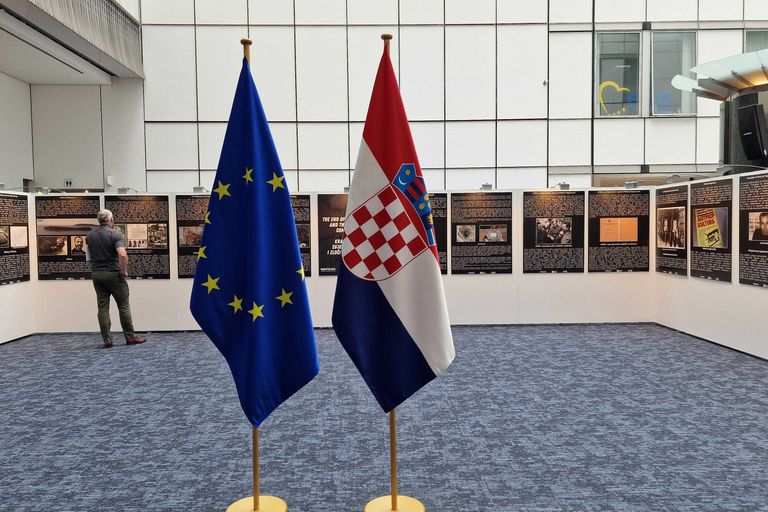Original article (in Bosnian) was published on 19/5/2025; Author: Nerma Šehović
Nearly 15-year-old claims about Croatia’s illegal entry into the European Union became popular again on social media in 2025.
A claim posted on Facebook on May 6, 2025, states that the Republic of Croatia joined the European Union illegally. In the Facebook post, this was “explained” in the following way:
Former Prime Minister Jadranka Kosor and former President of Croatia Ivo Josipovic signed the so-called mini-constitution of the EU, or the Lisbon Treaty, on December 9, 2011, during a summit in Brussels.
The signing of the Lisbon Treaty to join the Republic of Croatia with other states was allegedly against Article 135 of the Croatian Constitution, which prohibits such union before a national referendum.
After the Lisbon Treaty was signed, a referendum on EU accession was conducted, also supposedly in an illegal manner, because the State Electoral Commission (DIP) allegedly reported 605,103 more voters (by entering into the computer names of people who left Croatia in the 1990s)!
So, we were deceived twice!
We joined the EU illegally and have the legal right to leave it!!
By the time this analysis was written, the post had been shared 130 times. The same claims were also published on April 14, 2025, in an article by the conspiracy-focused web portal Truth Istinom protiv lazi.
Claims about the “illegal” signing of the Lisbon Treaty and Croatia’s entry into the EU have actually been circulating since 2011, when the signing of Croatia’s Accession Treaty to the EU was first announced. Certain groups even filed criminal charges against then-Prime Minister Jadranka Kosor and President Ivo Josipovic for what they claimed was “unconstitutional action”. Some websites repeated those claims in 2016, using the exact same explanation found in the analyzed Facebook post.
What are the Facts?
Article 135 of the Constitution of the Republic of Croatia states the following:
The right to initiate the process of association of the Republic of Croatia with other states belongs to at least one-third of the representatives in the House of Representatives of the Parliament, the President of the Republic, and the Government of the Republic of Croatia.
(…)
The House of Representatives of the Parliament makes a preliminary decision on such association with a two-thirds majority vote of all representatives.
The decision on the association of the Republic of Croatia is made by referendum with a majority vote of the total number of voters in the country.
So, the decision for Croatia to join an alliance is made through a referendum, but the right to initiate the process belongs to several state institutions. The House of Representatives of Parliament also decides on the matter.
In December 2002, the Parliament adopted the Resolution on the Accession of the Republic of Croatia to the European Union, which stated that “the accession of the Republic of Croatia to full membership in the European Union is a strategic national goal to which the Croatian Parliament will provide full and continuous support in its future activities”. Croatia submitted its application for EU membership in 2003, negotiations began in 2005, and concluded in 2011. On December 9, 2011, Croatia signed the Accession Treaty.
However, the treaty did not automatically come into force. For that to happen, it first had to be ratified by the parliaments of the EU member states and the Croatian Parliament, and a referendum on EU accession had to be held. The referendum in Croatia was held on January 22, 2012, and 66% of those who voted supported joining the European Union. The Croatian Parliament ratified the treaty on March 9, 2012. During this time, Croatia held the status of an acceding country to the EU and participated in EU institutions as an observer (link).
After the referendum, the Constitutional Court of Croatia received 22 requests to assess its constitutionality. On March 5, 2012, the Court issued a decision confirming that the referendum was conducted in accordance with Croatian law and the Constitution.
The Treaty on European Union states that the accession agreement between the EU and a country applying for membership must be ratified by all member states according to their constitutional requirements. Ratification is the final step in approving an agreement through which the signatories intend to commit. Only after ratification is complete does the agreement formally enter into force.
Once the ratification process was completed in Croatia and the EU member states, the treaty came into force, and on July 1, 2013, Croatia became the 28th full member of the European Union. Therefore, Croatia formally joined the EU in 2013, a year after the national referendum was held. The final decision on membership, in accordance with the country’s Constitution, rested in the hands of its citizens. Thus, the claim that Croatia illegally joined the EU is unfounded.
Croatia indeed has the legal right to leave the European Union. Article 50 of the Treaty on European Union states that any member state may decide to withdraw from the EU in accordance with its own constitutional requirements. If a country decides to withdraw, it notifies the European Council, and the EU negotiates and concludes an agreement with that country “setting out the arrangements for its withdrawal”.
Article 135 of the Constitution of the Republic of Croatia also states that its provisions on association (quoted earlier in this analysis) apply to the “conditions and procedure for disassociation of the Republic of Croatia”.
Given all the facts, the claim that Croatia joined the European Union illegally, because government officials signed the accession treaty before the referendum, is classified as disinformation.



